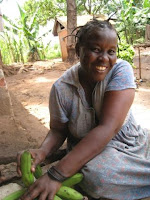“Charm is deceptive and beauty if fleeting; but a women who fears the Lord is to be praised.” Proverbs 31:31
Yesterday we celebrated Ugandan Independence day with a fellow Suubi woman (see Janet in the “Aunties” blog). She brews her own beer and sells it to a large group of village men. As you can see from the picture, these men are all dressed up and look like they just got off a hard day’s work. But when asked, the men confided that all of them are unemployed; no jobs, no ambition, no guilt about it. According to Janet these men sip away the afternoon with her homemade brew EVERY day.



Contrast this to the wives they leave at home every day. They scrub, suds, chop, fry, boil, raise, and provide all on their own. They “bring home the bacon, and fry it up too.” I always ask what their husbands’ do for work. The occasional man will work as a security guard, but the usual answer is that they find temporary work, which I realize now is a euphemism for “drink beer and play a board game underneath a tree all day long.” Maybe I am being too harsh here. And I apologize to the few men I have met here who work their tails off to provide for their families, like our security guard George and our two male tailors Charles and Herman.
But my frustration lies in the fact that these men do not help their wives by carrying any of the burden. For many household the Suubi salary of $9 a week is their only source of income. Here’s where my rant about husbands ends and my praise for their wives begins.
At the end of Proverbs, Solomon writes about the ideal wife. He says this wife of noble character is worth far more than rubies. Keep in mind this is the same King Solomon who had hundreds of concubines and wives from all across the region. But in Proverbs 31, he closes the book by sharing his wisdom learned from all of his life experiences and extramarital relationships. The Proverb is a little old fashioned by American standards because today many wives chose to work outside the home, and many of the tasks Solomon praises (such as sewing, gardening and trading) have been replaced by convenient inventions.
But what I have found here in the villages of Uganda are women who are the picturesque Proverbs 31 women.
“She is clothed with strength and dignity; she can laugh at the days to come. She speaks with wisdom and faithful instruction is on her tongue. She watched over the affairs of her household and does not eat the bread of idleness.”


Solomon’s words written thousands of years ago could have been written just yesterday after watching these women slave away at the affairs of their households, all the while with joy and dignity.
“She brings him good, not harm, all the days of her life.
She selects wool and flax and works with eager hands.
She is like the merchant ships bringing her food from afar.
She gets up while it is still dark; she provides food for her family and portions for her servant girls.
She considers a field and buys it; out of her earnings she plants a vineyard.
She sets about her work vigorously; her arms are strong for her tasks.
She sees that her trading is profitable, and her lamp does not go out at night.
In her hand she holds the distaff and grasps the spindle with her fingers.
She opens her arms to the poor and extends her hands to the needy.
When it snows, she has no fear for her household; for all of them are clothed in scarlet.
She makes coverings for her bed; she is clothed in fine linen and purple.
She makes linen garments and sells them, and supplies the merchants with sashes.”
At a Catholic mass I attended on Sunday, the priest spoke on marriage quoting Genesis that “two will become one.” He did not hold his tongue back when condemning the many men in church who have multiple wives, who beat their wives and who idly sit by to watch their wives act as their slaves. I couldn’t believe his boldness and courage to outright yell at these men for treating their wives as a part of their livestock rather than as part of their being. The priest reminded them that although polygamy and domestic violence may be a part of their culture, it is not a part of the gospel. And if these men are calling themselves Catholic Christians then they are called to a higher moral standard than their society has set.
Solomon closes his written illustration of a noble wife with this last line. “Give her the reward she has earned, and let her works bring her praise at the city gate.”
Amen.



































































